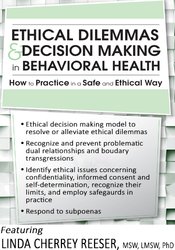
Ethical Dilemmas and Decision Making in Behavioral Health: How to Practice in a Safe and Ethical Way
Credit Available - See CEUs tab below.
- Categories:
- Legal | Ethics
- Faculty:
- Linda Cherrey Reeser, PhD
- Duration:
- 6 Hours 08 Minutes
- Original Program Date:
- May 17, 2019
- SKU:
- POS049770
- Media Type:
- Online Learning
Description
As a mental health professional, you are confronted on a regular basis with the challenges of complex ethical and legal issues. Knowing and applying an ethical decision making framework will provide you with tools to:
- Manage ethical issues in a systematic way
- Separate facts from assumptions and biases
- Track the potential harms of each course of action
- Formulate an ethical rationale for selecting the least harmful option
- Decide on the most appropriate way to implement your choice
- Assess what went wrong, or could go wrong, so you can prevent it from happening
Watch this recording and learn a unique decision making model that does not tell you which ethical principle is most important (as do some other models), but provides you with options and raises critical questions to help you decide which principal trumps others. Learning this model will also help you to formulate reasons for choosing how to intervene with other professionals or clients in an ethical and safe way. This reflective model will enable you to be the proactive practitioner you want to be!
Through case examples, you will be able to apply the skills right away! Case examples will focus on the issues of confidentiality, informed consent, boundaries and dual relationships and self-determination.
CEUs
This course is available for 6.25 total CPDs.
The HPCSA has declared that any on-line courses CPD/CEU credited by a certified US board, is automatically CPD/CEU credited in South Africa.
As there are different boards for different disciplines, we at Acacia suggest that you use the Counselling CPD/CEU credits. These correspond to South African credits of one CPD/CEU per 60 minutes. If you choose to use your discipline's credits, please do so at your discretion.
PESI, Inc. is an approved provider with the Florida Board of Clinical Social Work, Marriage and Family Therapy and Mental Health Counseling. Provider Number 50-399. This self-study course qualifies for 6.25 continuing education credits.
Handouts
| File type | File name | Number of pages | |
|---|---|---|---|
| Manual - Ethical Dilemmas and Decision Making in Behavioral Health (0.82 MB) | 46 Pages | Available after Purchase |
Faculty
Linda Cherrey Reeser, PhD Related seminars and products
Western Michigan University
Linda Cherrey Reeser, PhD, is a licensed social worker who has been teaching and consulting in Michigan for over 30 years. Dr. Reeser’s areas of professional expertise include ethics, professionalism, field education, activism and social change.
Dr. Reeser wrote a book on ethics with Dr. Wade Robison, Ethical Decision Making in Social Work (Allyn & Bacon). She is a long-standing member of the National Association of Social Workers (NASW) and has served on the Michigan Chapter Board as well as the Michigan NASW Ethics Committee.
Dr. Reeser is a full professor in the School of Social Work at Western Michigan University in Kalamazoo Michigan, where she serves as the coordinator of the BSW program, and has been teaching undergraduate and graduate social work students for 34 years.
She received the Teaching Excellence Award from her college and the NASW Michigan Chapter Lifetime Achievement Award for her contributions to the social work profession. She has been sought out by lawyers for her expertise in ethics. Her practice experience is in criminal justice and substance abuse.
Speaker Disclosures:
Financial: Linda Reeser has an employment relationship with Western Michigan University. She receives a speaking honorarium from PESI, Inc. She has no relevant financial relationships with ineligible organizations.
Non-financial: Linda Reeser has no relevant non-financial relationships.
Objectives
- Utilize an ethical decision making framework to recognize, analyze, resolve and/or prevent ethical problems and dilemmas in your clinical practice.
- Communicate how an understanding of common boundary and dual relationship issues/dilemmas can help you maintain appropriate relationships with your clients.
- Determine conditions and limits of self-determination in order to avoid negatively impacting the therapeutic alliance.
- Identify ethical issues concerning confidentiality and informed consent, recognize their limits and employ safeguards in your clinical practice.
- Analyze the limits of confidentiality as it relates to duty to warn law in clinical practice.
- Recognize ethical challenges you should consider when responding to subpoenas that request disclosure of client records.
Target Audience
- Counselors
- Psychologists
- Case Managers
- Psychotherapists
- Social Workers
- Marriage & Family Therapists
- Addiction Counselors
- Therapists
- Nurses
- Other Mental Health Professionals
Please wait ...
